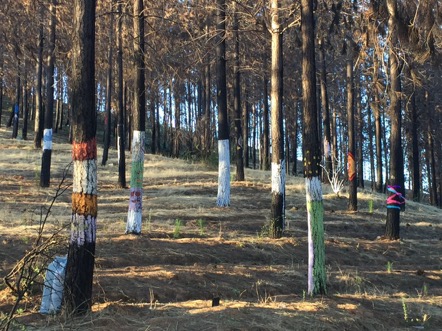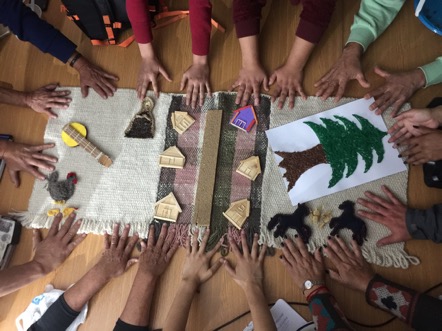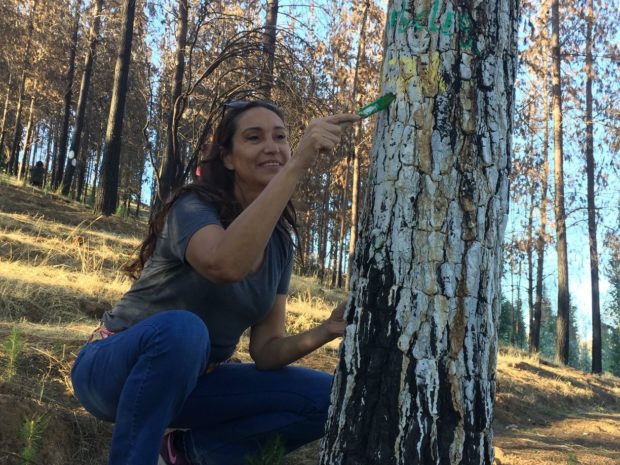
Painted forest in La Gloria. Image: Paulina Aldunce
By Alejandra Olguin Moncada
The trees are colorful.
But it’s not the leaves what gives them the color; it’s the trunk. And it’s not brown or red, it’s yellow, pink, blue, white and orange. It’s paint.
And the forest is noisy.
Not with birds or leaves moving at the rhythm of the wind, because there are no birds and no leaves. The noise comes from the drums of Juanita Parra, a Chilean musician who is trying to bring back the sound to this dark forest, to La Gloria, this land eaten by the fire during the summer of 2017 and leaving it’s 12 families with nothing.
That summer, the fires consumed more than 500,000 hectares of central Chile. It fit into a new category of world fires created by European Union experts designated as a “firestorm.” La Gloria was one of the towns most affected by it, and that’s why the Chilean government, in collaboration with academics from the University of Chile, worked with the people who lived through the trauma of losing everything.

Citizens of La Gloria made looms and expressed their feelings about the fire through art. Image: Paulina Aldunce.
The idea was to let the community express itself through art during the first six months of this year to strengthen its resilience. Residents painted the trunks of the trees in the blackened forest -which was the children’s idea- to bring back its color. They knitted on looms and created drawings. The people of La Gloria even produced a documentary. Neighbors acted and took charge of the lightning, sound and shooting. All of it was to make a sense of a tragedy.
Paulina Aldunce, part of the team from the university’s Program of Risk and Disaster Reduction (known as CITRID), has set her sights on climate change in Chile, which played a role in the fire. She started as an agronomist, but soon realized that to make a change about the way we relate to the environment, she had to do it through sociology. She earned a masters degree in Environmental Management and Planning and then moved with her family to Melbourne to get a doctoral degree in Philosophy in Social Sciences and Natural Resource Management. She was the one who brought Juanita Parra and her drums to the La Gloria project.
Aldunce recently discussed the program:
Q: What is the purpose of CITRID?
Paulina Aldunce: The program was founded in 2014 to respond both to the needs of research and of the society to advance in a more interdisciplinary approach to the reduction of risks in our country. We work together with professionals of the biophysical sciences such as climatologists, work engineers, earthquake systems, earthquakes and tsunamis, slide studies of psychologists, sociologists, anthropologists, human geographers. The idea is to work in a transdisciplinary way, combining different types of knowledge: scientific knowledge with all its disciplines, but also local and traditional knowledge.
For example, the knowledge of a person who lives by third generation in a place and knows exactly what happens in that locality, both geographically and socially. We make projects with them with different methodologies: interviews, workshops, maps, art therapy. But the important thing is that scientific knowledge is no longer the only valid or the most important, but is just one of the many knowledges that society possesses.

Paulina Aldunce
Q: Are these projects preventive or reactive?
Paulina Aldunce: Both. Many of them are to give opportunities for improvement to face disasters in the future, through the analysis of disasters that have already occurred, but it is also very important to rescue the voice of those who have suffered this kind of trauma. It is important not only to elucidate the reasons why things happen, but what people felt, what their perception was, how they used the information available to them, timely or not, what are the containment therapies, etc.
Q: In the case of the project in La Gloria, what were the objectives?
Paulina Aldunce: There were three main objectives: first, that people could connect again with the environment, because they were very angry with it after they had all burned up. It was also important to work in terms of psychosocial restraint, so that people could remember what happened without crying. And the third was to build a fire response plan. This activity was very interesting because it was a participatory plan where they proposed the solutions themselves. What we did was sit down and create social learning, which is when people tell their experiences and collective knowledge is generated, which is much greater than if everyone learned from their personal experiences, because it takes learning from the experiences of others.
Q: What do you think we are still lacking as a country to face climate change?
Paulina Aldunce: The issue of climate change is recent but very dynamic, and although there has been a lot of progress in Chile, it will always be insufficient. We must put more emphasis on evaluating what is done, because if it is not evaluated, we will hardly know if we are doing it well or not. More attention is missing to the local population, definitely. It is they who receive the direct impact of climate change. I think that we also need to make progress in adapting and making everyone aware, in that we have to understand that changes do not only happen at the governmental level, but that everyone – from the farmer and the citizen – has to take part on it.
Alejandra Olguin Moncada was a participant in a recent Knight Center for Environmental Journalism workshop for Chilean journalists and journalism students.
